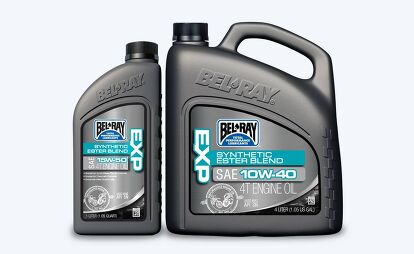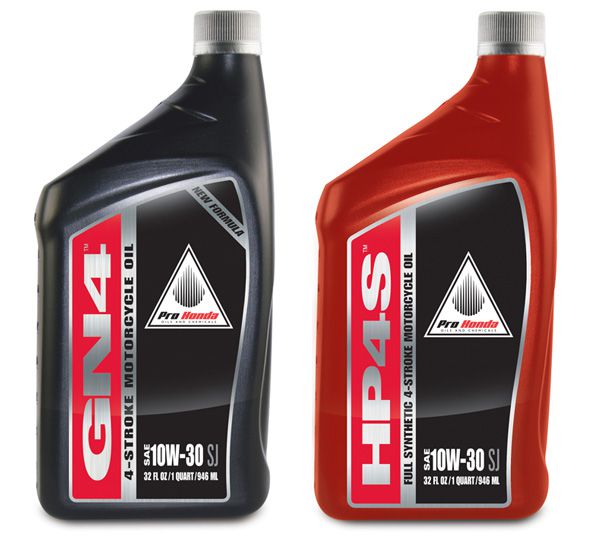For the best motorcycle oil, consider factors like viscosity, additives, and brand reputation. Choosing the right oil can enhance engine performance and longevity, ensuring a smooth ride and optimal protection for your motorcycle.
With various options available in the market, selecting the best motorcycle oil can be a daunting task. However, by understanding the specific requirements of your bike and consulting with experts, you can make an informed decision that will benefit your motorcycle in the long run.
In this blog post, we will explore the key factors to consider when selecting the best motorcycle oil to keep your bike running smoothly and efficiently.

Credit: www.motorcycle.com
Keep Reading: Right Engine Oil for Yamaha Aerox 155
Introduction To High-performance Motorcycle Oils
Discover the best motorcycle oil for high-performance engines. Enhance your bike’s efficiency and durability with top-quality motorcycle oils designed to withstand extreme conditions and provide superior protection. Keep your engine running smoothly and maximize performance with the right motorcycle oil for your ride.
The Role Of Oil In Motorcycle Engines
Oil is the lifeblood of any motorcycle engine, and choosing the right oil is crucial to ensure your engine runs smoothly and efficiently. Motorcycle oils perform a variety of functions, including lubricating the engine’s moving parts, reducing friction and wear, and regulating engine temperature. It also helps to prevent rust and corrosion, and remove contaminants and debris from the engine.
Benefits Of Choosing The Right Oil
Choosing the right oil for your motorcycle can have several benefits. Firstly, it can help to improve your engine’s performance and fuel efficiency. High-performance motorcycle oils are designed to reduce friction and wear, which can help to increase horsepower and torque. Additionally, using the right oil can help to extend the life of your engine, reducing the need for costly repairs and maintenance. Moreover, high-performance motorcycle oils can provide better protection in extreme conditions, such as high temperatures or heavy loads. They can also help to prevent engine deposits and sludge, which can cause damage to the engine over time. In conclusion, choosing the right high-performance motorcycle oil is essential for maintaining the health and longevity of your motorcycle engine. It is important to choose an oil that meets the manufacturer’s specifications and is designed for the specific needs of your motorcycle. By doing so, you can enjoy improved performance, fuel efficiency, and protection for your engine.
Synthetic Vs. Conventional Oils
Synthetic and conventional oils are both options for motorcycle oil, but there are differences to consider. Synthetic oil offers superior performance and protection, while conventional oil is more affordable. Choose the best motorcycle oil based on your specific needs and budget.
When it comes to choosing the best motorcycle oil, one of the most debated topics is whether to use synthetic or conventional oils. Synthetic oils are artificially made, while conventional oils are derived from crude oil. In this post, we will explore the chemical composition differences, performance, and durability of synthetic and conventional oils to help you make an informed decision.
Chemical Composition Differences
Synthetic oils are made of chemical compounds that are engineered to provide superior lubrication and protection compared to conventional oils. They are designed to have a uniform molecular structure, which helps them flow better at low temperatures and resist breakdown at high temperatures. Conventional oils, on the other hand, contain impurities and irregular molecules that can break down and cause sludge buildup over time.
Performance And Durability
Synthetic oils offer better performance and durability compared to conventional oils. They provide excellent engine protection, reduce engine wear and tear, and improve fuel efficiency. They are also more resistant to oxidation and thermal breakdown, which means they last longer and require fewer oil changes. Conventional oils, on the other hand, are less expensive but require more frequent oil changes and may not provide adequate protection in extreme conditions. In conclusion, while synthetic oils are generally more expensive than conventional oils, they offer superior performance, durability, and protection. However, the choice ultimately depends on the type of bike, riding conditions, and personal preferences. It’s always best to consult the bike manufacturer’s recommendations and choose a high-quality oil that meets the required specifications.
Viscosity Grades Explained
Viscosity grades are a critical aspect of choosing the right motorcycle oil for your engine. Understanding viscosity ratings and selecting the appropriate grade can significantly impact your bike’s performance and longevity. Let’s delve into the details of viscosity grades and how they can benefit your motorcycle.
Understanding Viscosity Ratings
Viscosity ratings are denoted by a two-number code, such as 10W-40, where the first number followed by the “W” (which stands for winter) indicates the oil’s flow characteristics at cold temperatures, while the second number represents its behavior at operating temperatures. Lower numbers indicate thinner oils, while higher numbers denote thicker oils. For instance, a 10W oil flows more easily in cold conditions than a 20W oil.
Choosing The Right Grade For Your Engine
When selecting the appropriate viscosity grade for your motorcycle engine, consider the manufacturer’s recommendations outlined in the owner’s manual. Additionally, factors such as climate, riding conditions, and engine age should influence your decision. For example, in colder climates, a lower first number (5W or 10W) is recommended to ensure proper lubrication during cold starts, while a higher second number (such as 40 or 50) provides adequate protection at high temperatures and under heavy loads.

Credit: www.youtube.com
Top Contenders For Best Motorcycle Oil
Choosing the right motorcycle oil is crucial for the optimal performance and longevity of your bike. With so many options available in the market, it can be overwhelming to determine which one is the best fit for your motorcycle. To help you make an informed decision, we have compiled a list of the top contenders for the best motorcycle oil. These brands have gained popularity and have received positive feedback from users, making them reliable choices for your bike’s engine.
Leading Brands In The Market
When it comes to motorcycle oil, several leading brands have established themselves as reliable and trusted options. These brands have a track record of delivering high-quality products that meet the specific requirements of motorcycle engines. Here are some of the top contenders:
| Brand | Key Features |
|---|---|
| Brand 1 | High-performance formula, excellent engine protection, superior lubrication. |
| Brand 2 | Advanced additives, enhanced fuel economy, reduced engine wear. |
| Brand 3 | Optimized for specific motorcycle types, improved clutch performance. |
User Reviews And Testimonials
One of the best ways to gauge the effectiveness of a motorcycle oil is by considering user reviews and testimonials. Real-life experiences from fellow riders can provide valuable insights into the performance and reliability of different oils. Here are some testimonials from motorcycle enthusiasts who have used these top contenders:
- “I have been using Brand 1 oil for years, and it has never let me down. My engine runs smoothly, and I can feel the difference in performance.” – John D.
- “After switching to Brand 2 oil, I noticed a significant improvement in fuel efficiency. It also seems to protect my engine better compared to other oils I’ve tried.” – Sarah M.
- “Brand 3 oil is specifically designed for my motorcycle type, and I can feel the difference in my clutch’s performance. Shifting gears has never been smoother.” – Mark R.
These positive user reviews and testimonials highlight the effectiveness and reliability of these top contenders for best motorcycle oil. Consider these firsthand experiences when making your decision.
Additives And Their Impact
When it comes to choosing the best motorcycle oil for your bike, understanding the role of additives is crucial. Additives are chemical compounds that are blended into the base oil to enhance its performance and provide additional benefits. These additives can have a significant impact on the overall quality and effectiveness of the oil, ensuring optimal engine protection and performance.
Common Additives In Motorcycle Oils
Motorcycle oils commonly contain various additives that serve specific purposes. These additives can include:
- Detergents and Dispersants: These additives help to keep the engine clean by preventing the formation of deposits and sludge.
- Anti-Wear Agents: These additives form a protective layer on metal surfaces to reduce friction and wear, extending the lifespan of engine components.
- Viscosity Index Improvers: These additives help to maintain consistent oil viscosity across a wide range of temperatures, ensuring proper lubrication in both hot and cold conditions.
- Antioxidants: These additives prevent the oxidation of the oil, which can lead to the formation of harmful sludge and varnish.
- Foam Inhibitors: These additives reduce the formation of foam, which can interfere with proper lubrication and lead to engine damage.
Pros And Cons Of Additive-enhanced Oils
Additive-enhanced motorcycle oils offer several benefits, but it’s important to consider both the pros and cons:
| Pros | Cons |
|---|---|
| Improved engine cleanliness and protection | Potential for higher cost |
| Reduced friction and wear on engine components | Possible compatibility issues with certain engine types |
| Enhanced oil stability and resistance to oxidation | Some additives may have limited effectiveness over time or under extreme conditions |
| Optimized viscosity performance across temperature ranges | May not be necessary for all motorcycles, depending on usage and engine design |
Considering these factors, it’s essential to select a motorcycle oil that suits your specific bike, usage, and performance requirements. Consulting your motorcycle’s manufacturer recommendations and seeking expert advice can help you make an informed decision.
Changing Your Motorcycle Oil
Step-by-step Guide
When changing your motorcycle oil, it’s important to follow a step-by-step guide to ensure the process is done correctly. Here are the essential steps to changing your motorcycle oil:
- Warm up the engine to allow the oil to flow easily.
- Place a drain pan beneath the oil pan and remove the drain plug to let the old oil drain out completely.
- Remove the oil filter and replace it with a new one.
- Reinstall the drain plug and fill the engine with the recommended amount and type of motorcycle oil.
- Check for any leaks and dispose of the old oil properly.
Frequency And Indicators For Oil Change
Regular oil changes are crucial for maintaining the performance and longevity of your motorcycle. The frequency of oil changes can vary depending on the type of motorcycle and how often it’s ridden. However, a general rule of thumb is to change the oil every 3,000 miles or at least once a year, even if the mileage hasn’t been reached. Additionally, certain indicators like dark or gritty oil, engine knocking, or decreased fuel efficiency may signal the need for an oil change.
Motorcycle Oil For Different Riding Styles
Motorcycle oil is essential for optimal performance, especially when it comes to different riding styles. Choosing the best motorcycle oil can make a significant difference in engine longevity and performance. Whether you’re a cruiser, sportbike enthusiast, or adventure rider, selecting the right oil for your specific riding style is crucial for a smooth and reliable ride.
Trustworthy brands offer a range of options designed to meet the unique demands of each riding style.
Racing Oils Vs. Touring Oils
For riders who push their bikes to the limits, racing oils are formulated to withstand extreme temperatures and high RPMs. On the other hand, touring oils are designed for long rides, offering better longevity and protection.
Customizing Oil Choice For Your Riding Needs
Consider your riding habits when selecting motorcycle oil. Customize your choice based on factors like frequency of rides and typical weather conditions. Match the oil viscosity to your bike’s engine requirements.

Credit: www.cycleworld.com
Economic And Environmental Considerations
When choosing the best motorcycle oil, it’s essential to consider both the economic impact and environmental aspects. Let’s delve into the cost-effectiveness of premium oils and eco-friendly options.
Cost-effectiveness Of Premium Oils
Premium oils offer superior protection, extending engine life and reducing maintenance costs.
- Enhanced lubrication reduces friction and wear on engine parts.
- Longer oil change intervals mean less frequent service visits.
- Higher thermal stability ensures oil remains effective in extreme conditions.
Eco-friendly Motorcycle Oil Options
Opting for eco-friendly oils benefits the environment and your bike’s performance.
| Benefits of Eco-friendly Oils: | |
|---|---|
| Biodegradable formulas reduce environmental impact. | |
| Low toxicity minimizes harm to aquatic life. | |
| Renewable resources used in production support sustainability. |
Future Trends In Motorcycle Lubricants
The future of motorcycle lubricants is shaping up with exciting trends that are set to revolutionize the industry. As technology advances, innovations in motorcycle oils are on the horizon, bringing about significant changes and improvements for riders and their machines.
Innovations On The Horizon
- Nano lubricant particles for enhanced engine protection.
- AI-driven lubricant formulations for optimal performance.
- Integration of smart technology for real-time oil monitoring.
The Shift Towards Sustainability
- Bio-based oils to reduce environmental impact.
- Recyclable packaging for eco-friendly disposal.
- Development of biodegradable lubricants for greener alternatives.
Conclusion: Elevating Your Ride With The Right Oil
Elevate your ride with the best motorcycle oil for peak performance and engine protection. Choose the right oil to enhance your motorcycle’s longevity and ensure smooth, efficient operation on the road. Prioritize quality and compatibility to keep your bike running at its best.
Summary Of Key Takeaways
Choosing the right motorcycle oil is crucial for optimal performance and engine longevity.
Key factors include viscosity, oil type, and compatibility with your bike’s engine.
Final Recommendations
Consult your owner’s manual for the recommended oil grade and change intervals.
Consider synthetic oils for enhanced protection and performance benefits.
Frequently Asked Questions
What Is The Importance Of Using The Best Motorcycle Oil?
Using the best motorcycle oil ensures optimal engine performance, improved fuel efficiency, and prolonged engine life.
How Does The Quality Of Motorcycle Oil Affect Engine Performance?
The quality of motorcycle oil directly impacts engine performance by reducing friction, preventing wear and tear, and maintaining proper lubrication.
What Are The Key Factors To Consider When Choosing The Best Motorcycle Oil?
When choosing the best motorcycle oil, factors such as viscosity, additives, certifications, and compatibility with your bike’s engine should be considered.
How Often Should Motorcycle Oil Be Changed?
Motorcycle oil should be changed according to the manufacturer’s recommendations, typically every 3,000 to 5,000 miles or every six months, whichever comes first.
Can Using The Wrong Motorcycle Oil Cause Engine Damage?
Yes, using the wrong motorcycle oil can lead to engine damage as it may not provide sufficient lubrication, leading to increased friction and potential overheating.
Are Synthetic Motorcycle Oils Better Than Conventional Oils?
Synthetic motorcycle oils offer better performance and protection compared to conventional oils, thanks to their superior thermal stability and resistance to breakdown.
Can Using A Higher Viscosity Motorcycle Oil Improve Engine Performance?
Using a higher viscosity motorcycle oil than recommended by the manufacturer can lead to poor engine performance, increased friction, and potential damage.
How Can I Determine The Right Motorcycle Oil For My Bike?
To determine the right motorcycle oil for your bike, refer to your owner’s manual or consult with a professional mechanic who can recommend the suitable oil based on your bike’s specifications.
Conclusion
Choosing the best motorcycle oil is crucial for optimal engine performance and longevity. By considering factors like viscosity, additives, and brand reputation, riders can ensure smooth and reliable operation. Regular oil changes with high-quality products will maintain the health of the engine, providing peace of mind on the road.

